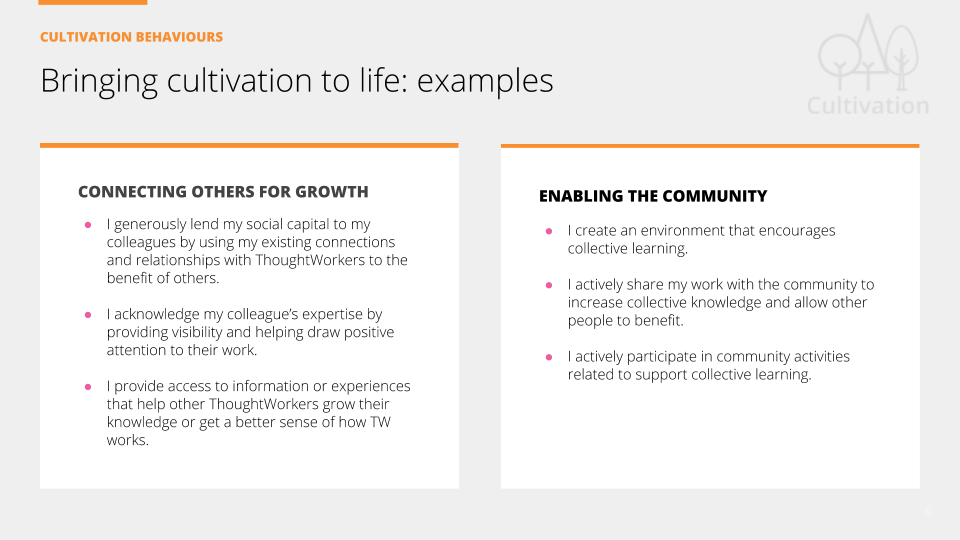
Accelerate employee’s growth by fostering a “Cultivation” culture
The definition and the behaviours
While the most common definition of cultivation refers to the action of cultivating land, we use this terminology to refer to a culture of collective learning that focuses on growing and enabling each other. A culture of cultivation is one where people act with the belief that “we succeed by growing people who fulfil our vision”, says William Schneider who developed the “Core Culture model” in 1994. In his model, he defines 4 basic types of Cultures within corporate organisations: Collaboration, Control, Competence and Cultivation. It is possible for an organization to have one or more dominant quadrants or to sit across multiple ones.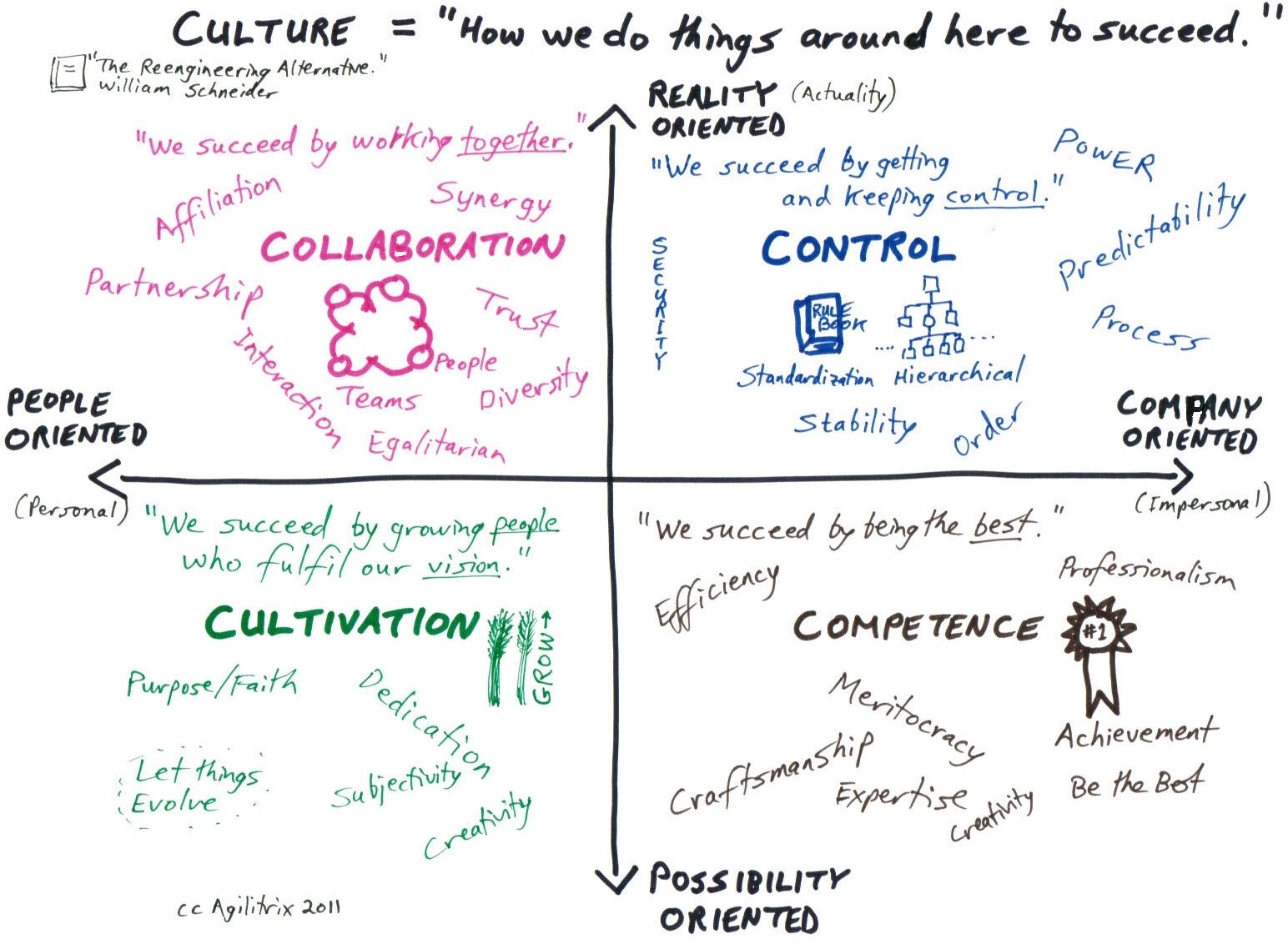
The Schneider model.
Source of image: article by Michael Sahota
When we interviewed Thoughtworkers to understand their thoughts and opinions about cultivation, we realized that for most people “cultivation” didn’t mean much or it meant different things for people in different regions. So we identified a strong need to align on a definition and shape what cultivation means at Thoughtworks.
We socialized the definition from the Schneider model, alongside some sentences crafted to address the most common questions and doubts from our colleagues: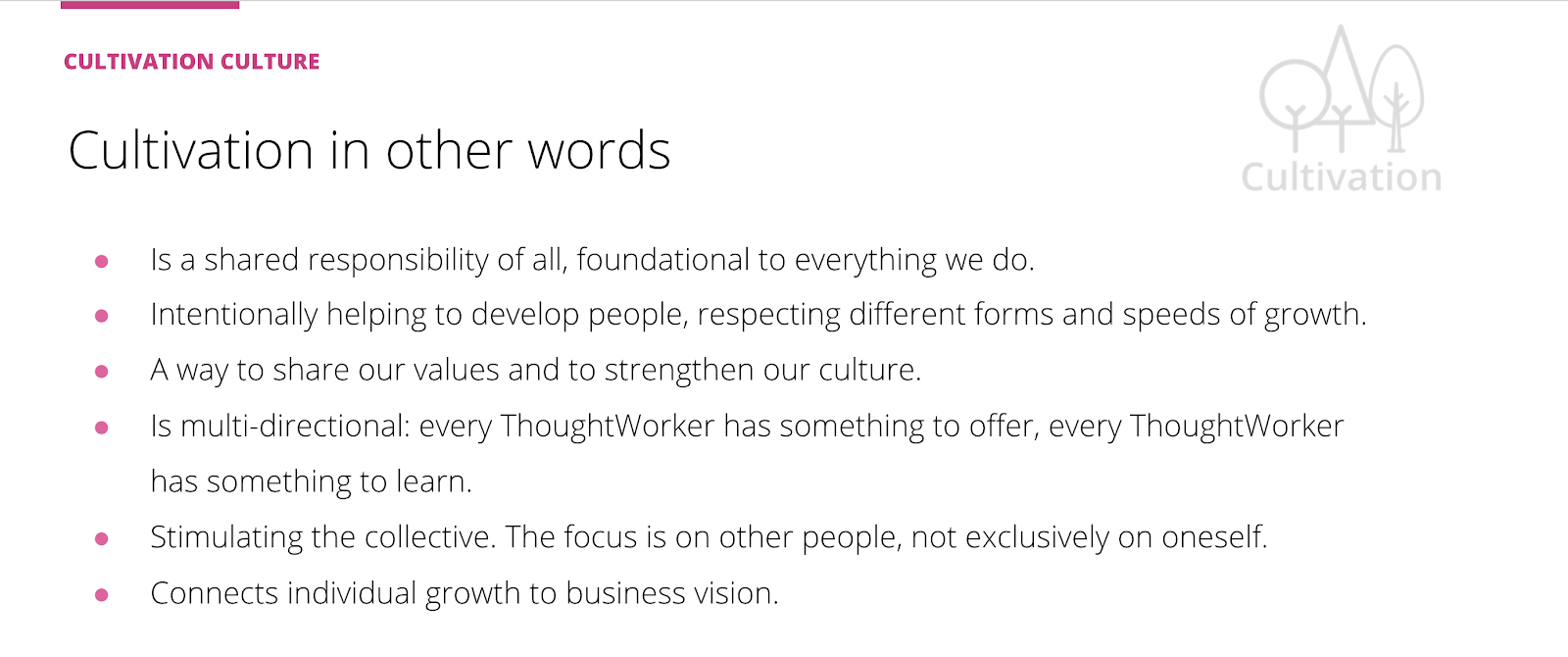
Finally, to ensure a shared understanding of Cultivation, we spelled out what cultivation is not: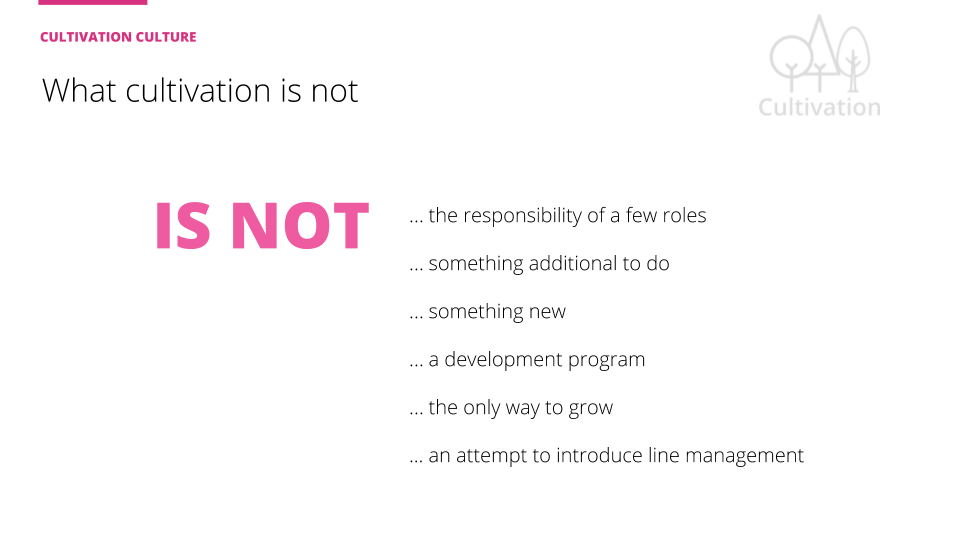
Articulating cultivation: ‘Cultivation in other words’ and ‘What cultivation is not’.
Once we agreed on a definition, we focused on how to help our colleagues to practice “Cultivation”. Therefore, we created and socialized cultivation behaviours, to help people understand how they can bring cultivation to life and to provide them with a common language to describe actions related to cultivation. One behaviour doesn’t exclude another, and all Thoughtworkers are invited to explore the behaviours, play and practice with them to find inspiration for their own way of cultivation.
"The idea of introducing behaviours comes from the desire to make an abstract concept like cultivation tangible. Our beliefs manifest in our actions. Our behaviours can be observed by others that can encourage us or help us to improve."
- Sara Michelazzo, Service Designer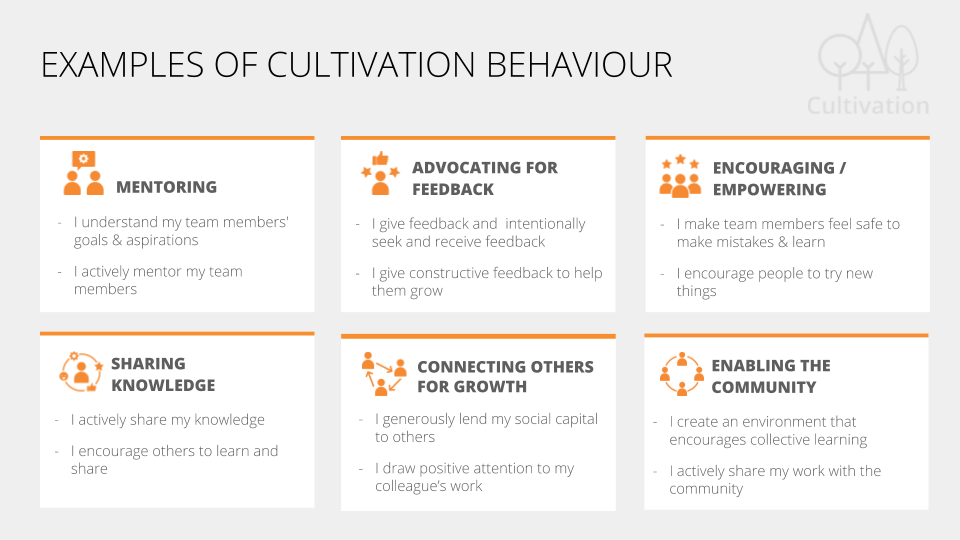
Examples of cultivation behaviours.

Examples of how we articulated behaviours in more detail.
4 steps to strengthen ‘Cultivation culture’
Our journey towards Cultivation culture followed 4 main steps:
Maturity model for implementing Cultivation.
1. Shifting Mindset
The first step towards a culture of cultivation was to make sure that everyone understands what Cultivation is, how it can be brought to life and why it is so important for each employee and the organisation as a whole. For Thoughtworks Germany, this mindset shift was supported through company-wide Cultivation Workshops that focused on sharing the definition, tangible behaviours and individual cultivation stories of what made people grow in their professional career. We ran workshops with 299 participants, 86% of the total headcount. After the workshop, 93% of participants agreed they knew how to apply cultivation behaviours.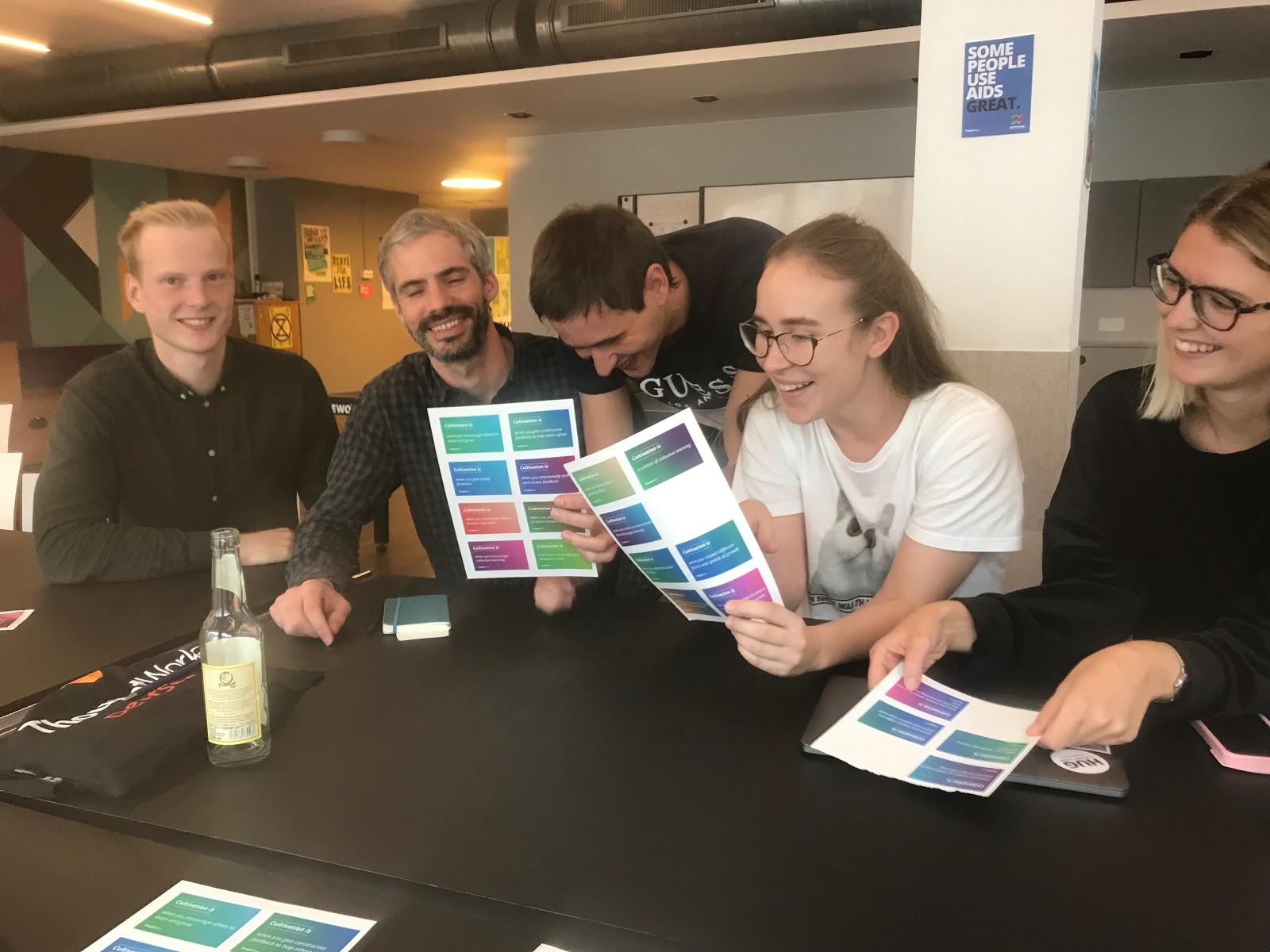
During the workshops, we handed over some stickers for Thoughtworkers to put on their laptops. The stickers communicate some short messages that represent bites of the Cultivation Culture as a visual reminder of who or what we want to be.
2. Upskilling employees
Once the foundation was established, we moved the focus towards upskilling employees to develop the capabilities required for cultivating others. Some of the most important skills we identified are: effective feedback, mentoring, having difficult conversations, setting growth goals and spotting and nurturing potential in others. Our Learning and Development specialists produced custom learning experiences (playbooks, training, workshops, online courses) needed to grow others, such as ‘Giving and receiving feedback’. These learning resources were made available to all Thoughtworkers via our intranet.
3. Systemising & Celebrating
While upskilling employees, we also started to “systemise” Cultivation by integrating it into business operations with the intention to make the change sustainable. For example, we included questions about Cultivation into our recruiting process and we started to share Cultivation core values with new employees. In Thoughtworks Germany, Cultivation impact is one of the factors that contributes to a promotion or salary increase. Last but not least, to make Cultivation stick, we created opportunities to celebrate it and to acknowledge people that help others grow in their day-to-day work.
Left: Appreciation cards to thank colleagues for their cultivation effort in Thoughtworks Germany
Right: Growth Tapas, a newsletter to celebrate cultivation and growth in Thoughtworks Germany.
4. Sustaining
To sustain the cultural change in the long term, the team defined clear roles and responsibilities for ongoing support and a governance structure to keep Cultivation at the forefront of people’s minds is key. Cultivation started as a change program in Thoughtworks Germany and after 15 months we are transferring the ownership of cultivation activities to the Talent team and, in the near future, they will treat this as business as usual.
Benefits
Employers, employees and in our case, also clients, can benefit from a culture of cultivation alongside the support of individual growth.

Takeaways to implement Cultivation
If you are interested in fostering a cultivation culture in your organization, here are a few recommendations:- Take the time to craft your messages and to communicate clearly with your employees, to help them connect Cultivation to their day-to-day work. Make expectations towards Cultivation tangible, talk about observable behaviours and share meaningful stories to make it real because Culture is abstract.
- Celebrate the cultivation culture to make it stick. What an organization decides to celebrate and reward becomes important. Each celebration is a reminder of the value of cultivation that inspires people to lead as role models.
- Stay resilient, it is a long game. Culture shifts take time and patience. It’s a marathon, not a sprint. But in the long run, it can truly make the difference for your organization.
References
1 A culture of cultivation is one where people act with the belief that 'we succeed by growing people who fulfil our vision', says William Schneider who developed the 'Core Culture model' in 1994. In his model, he defines four basic types of Cultures within corporate organisations: Collaboration, Control, Competence and Cultivation. It is possible for an organisation to have one or more dominant quadrants or to sit across multiple ones. An explanation and image of the Scheider model is available in the article 'How to Make Your Culture Work with Agile, Kanban & Software Craftsmanship' by Michael Sahota.
Book reference: The Reengineering Alternative: A Plan for Making Your Current Culture Work by William Schneider - September 1999, McGraw-Hill Companies.
Disclaimer: The statements and opinions expressed in this article are those of the author(s) and do not necessarily reflect the positions of Thoughtworks.















